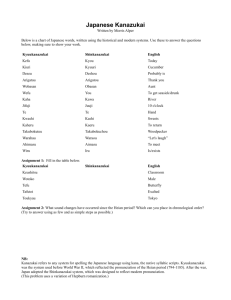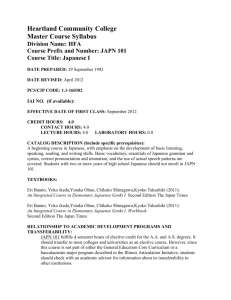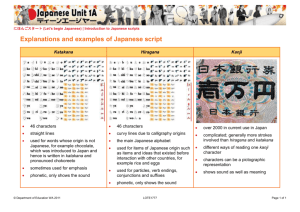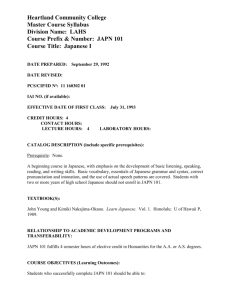Course Prepared by: Yoriko Tanigawa State: Pohnpei
advertisement
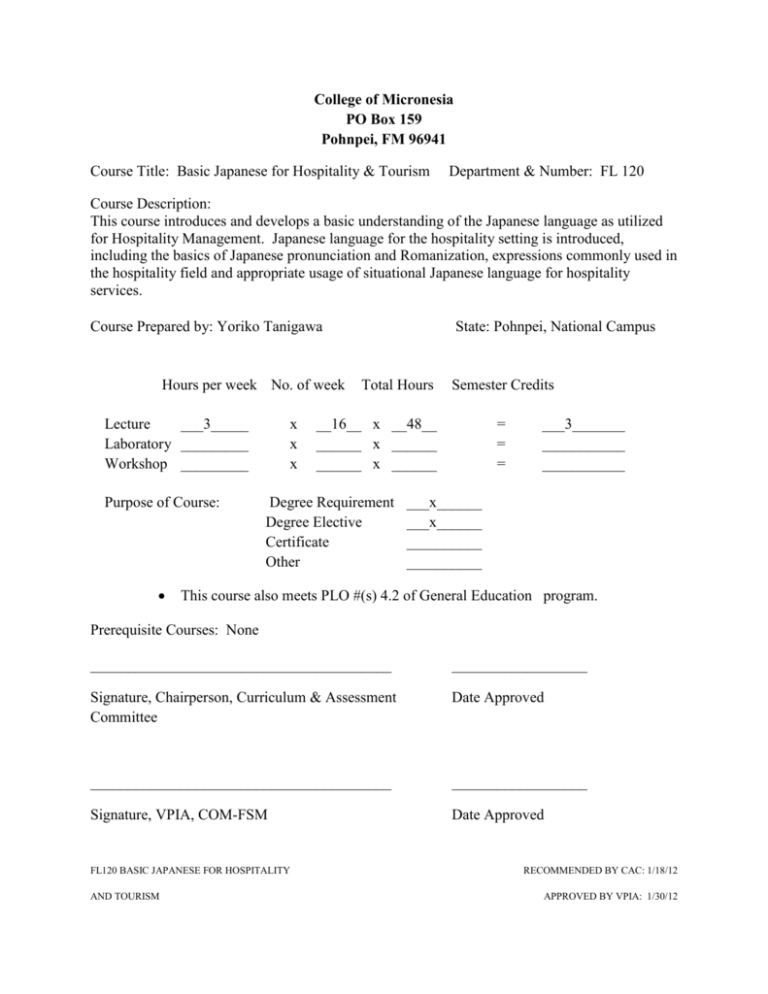
College of Micronesia PO Box 159 Pohnpei, FM 96941 Course Title: Basic Japanese for Hospitality & Tourism Department & Number: FL 120 Course Description: This course introduces and develops a basic understanding of the Japanese language as utilized for Hospitality Management. Japanese language for the hospitality setting is introduced, including the basics of Japanese pronunciation and Romanization, expressions commonly used in the hospitality field and appropriate usage of situational Japanese language for hospitality services. Course Prepared by: Yoriko Tanigawa Hours per week No. of week Lecture ___3_____ Laboratory _________ Workshop _________ Purpose of Course: x x x State: Pohnpei, National Campus Total Hours Semester Credits __16__ x __48__ ______ x ______ ______ x ______ Degree Requirement Degree Elective Certificate Other = = = ___3_______ ___________ ___________ ___x______ ___x______ __________ __________ This course also meets PLO #(s) 4.2 of General Education program. Prerequisite Courses: None ________________________________________ __________________ Signature, Chairperson, Curriculum & Assessment Committee Date Approved ________________________________________ __________________ Signature, VPIA, COM-FSM Date Approved FL120 BASIC JAPANESE FOR HOSPITALITY AND TOURISM RECOMMENDED BY CAC: 1/18/12 APPROVED BY VPIA: 1/30/12 A. PROGRAM LEARNING OUTCOMES (PLOs): The student will be able to: 1. Explain the interdependent components of the international hospitality and tourism industry including transportation, customer service, food service, lodging, attraction management, roles of national and state visitors’ authorities, marketing and sales. 2. Demonstrate professional lodging specific technical skills, supervisory techniques and management skills. 3. Explain the types and elements of food service operations. 4. Demonstrate front of the house technical and supervision techniques. 5. Describe tourism attraction support services and related business opportunities. 6. Describe the importance of developing the FSM as a sustainable tourism destination. 7. Communicate in basic Japanese for lodging, food service and tourism provider guest services. B. STUDENT LEARNING OUTCOMES (SLOs) - GENERAL: The student will be able to: 1. Explain and demonstrate the basics of pronunciation and Romanization of the Japanese words from the Hiragana writing system. 2. Demonstrate proper usage and understanding of the Japanese language as appropriate to various situations within the Hospitality and Tourism industry. SLO PLO 1 PLO2 PLO3 PLO4 PLO5 PLO6 PLO7 1 ID 2 ID I = Introduced D = Demonstrated C. STUDENT LEARNING OUTCOMES (SLOs)-SPECIFIC: The student will be able to: General SLO 1. Explain and demonstrate the basics of pronunciation and Romanization of the Japanese words and phrases in the Hiragana writing system. Student Learning Outcomes Assessment Strategies 1.1. Identify and demonstrate the proper pronunciation and Oral presentations assessed Romanization of Japanese words and phrases in Hiragana. with a checklist; quizzes 1.2. Demonstrate proper vowel pronunciation Oral presentation as assessed with a checklist; quizzes 1.3. Identify and demonstrate proper consonant Oral presentations as assessed pronunciation, with close attention to the N, M and NG with a checklist; quizzes FL120 BASIC JAPANESE FOR HOSPITALITY AND TOURISM RECOMMENDED BY CAC: 1/18/12 APPROVED BY VPIA: 1/30/12 consonant sounds. General SLO 2. Demonstrate proper usage and understanding of the Japanese language as appropriate to various situations within the Hospitality and Tourism industry. Student Learning Outcomes Assessment Strategies 2.1. Recite and use Japanese greetings and farewell expressions Oral presentations as assessed by a checklist 2.2. Identify and recite useful expressions common to the field Oral presentation assessed with a checklist and quizzes 2.3. Identify, recite and use numbers and counting as Oral presentation assessed appropriate to the items and/or situation with a rubric and quizzes 2.4. Demonstrate proper use of basic Japanese dialogue patterns Oral presentation as assessed with a checklist and quizzes 2.5. Recite/demonstrate specific situational dialogue exchanges Oral discussions as assessed with a checklist and quizzes D. COURSE CONTENT 1. Pronunciation and Romanization of Japanese phrases in the Hiragana writing system. 2. Vowel and consonant pronunciation and usage. 3. Appropriate use of greetings and farewells. 5. Useful Expressions for Hospitality and Tourism fields 6. Numbers and counting as appropriate to specific items/situations. 7. Basic situational dialogue. E. METHODS OF INSTRUCTION Lectures, handouts, pattern practice, oral drills, presentations, role-play, group work F. REQURIED TEXT(S) AND COURSE MATERIALS Fuketa, Keiko. Basic Japanese for Hotel and Restaurant. Campus HRM Division, 2008. (or most recent edition) Pohnpei: COM-FSM Pohnpei G. REFERENCE MATERIALS JAL ACADEMY. Service Japanese-for Hotel staff. Tokyo: Bonjinsha, 2003. (or most recent edition) H. INSTRUCTIONAL COSTS None FL120 BASIC JAPANESE FOR HOSPITALITY AND TOURISM RECOMMENDED BY CAC: 1/18/12 APPROVED BY VPIA: 1/30/12 I. EVALUATION None J. CREDIT BY EXAMINATION None FL120 BASIC JAPANESE FOR HOSPITALITY AND TOURISM RECOMMENDED BY CAC: 1/18/12 APPROVED BY VPIA: 1/30/12
